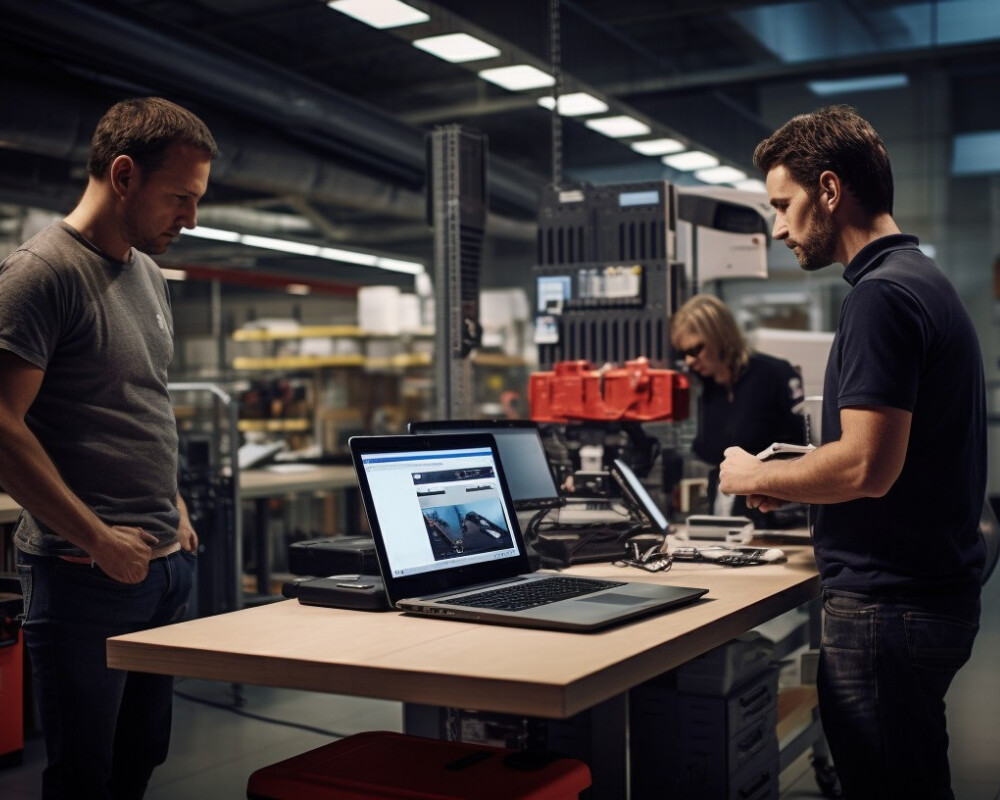Over the last few decades, companies the world over have been seeking to improve their production methods, balancing quality, time and cost. This quest for continuous improvement is, in fact, the objective of Lean methods. If we take a closer look at the industrial world, we see that increasingly rapid technological advances are forcing factories to adapt in order to remain competitive. In fact, we're talking about Industry 4.0. So what's the link between Lean Manufacturing and Industry 4.0? How can these concepts be combined to benefit industrial players?
Lean management, industry 4.0
What are we talking about?
Before getting to the heart of the matter, here are a few reminders of the concepts we're talking about in this article.
Key lean manufacturing concepts
Toyota is credited with the concept of "lean manufacturing". In fact, after the Second World War, the company completely overhauled the way it produced vehicles to meet the growing demands of its customers. Building on its success, this philosophy quickly spread around the world.
Lean means optimize the entire production chain without putting customer requirements on the back burner. The aim is to improve overall production flow. For example, we take steps to reduce the scrap rate, or to avoid unnecessary travel. But there's more to lean than that. The idea is to provide a sound basis for operational excellence by creating a culture of continuous improvement and empowering employees.
What is Industry 4.0?
The Industry 4.0 concept involves the use of innovative plant technologies. This covers technologies such as the Industrial Internet of Things (IIoT), the cloud, cutting-edge computing as well as other key concepts such as machine-to-machine communication (M2M) and cyber-physical systems (CPS).
Indeed, the foundation of the fourth industrial revolution lies in automation. The exchange of data collected by the above-mentioned technologies serves the objective of making industrial practices more efficient and autonomous.
Read more:
In response to the technological challenges posed by the current industrial context, so-called "Lean" methods have also evolved.
Lean manufacturing 4.0: what impact for factories?
At the crossroads between industry 4.0 and lean manufacturing, Lean manufacturing 4.0 is also known as "Lean Automation", "Smart Lean" or "Lean industry 4.0".
To maximize their chances of achieving operational excellence, plants have every interest in implementing lean methods coupled with Industry 4.0 tools.
Data retrieved in real time enables ideal collaboration between humans and machines, providing a global view of production and enabling operators to make any necessary adjustments in real time.
A study by BCG shows that companies that combine lean and industry 4.0 can achieve a cost reduction of 40 %. In other words, the combination of lean and industry 4.0 doubles the savings achieved compared to the application of each of them separately.
The combined benefits of Industry 4.0 and lean manufacturing
The lean manufacturing 4.0 approach amplifies the benefits of each of these concepts separately. Here are a few examples:
1. Deepening the customer-centric vision
In the digital age, it has never been easier for manufacturers to get a clear picture of their customers' needs. For example, advanced data analysis (thanks in particular to artificial intelligence) makes it possible to establish trends and even make predictions about future customer needs and requirements.
Another example is mass customization. Today, customers benefit from relatively advanced customization options, made possible by the integration of automated and semi-automated robots into production lines.
In this way, one of lean's flagship concepts, "just in time", is reinforced by the technological levers of Industry 4.0.
2. Continuous improvement
A continuous improvement program on a production line can selectively modify a variable, test it in real time and review the results accordingly. New technologies such as simulation tools enable manufacturers to test their hypotheses first in the virtual world, before implementing them in the physical world.
It's another way of reinforcing a key lean concept through Industry 4.0 tools.
The limits of lean manufacturing 4.0
Although Lean Manufacturing 4.0 is an invaluable tool for achieving operational excellence, we feel it is essential to point out certain limitations. Indeed, it is important to bear in mind that lean manufacturing 4.0 is a philosophy, an ideal to strive towards, and not a model to be replicated at all costs.
The superimposition of new technologies can ultimately make a production line more costly to run. What's more, it requires an increase in the skills of both operators and managers. The shortage of skills on the market is a major concern for manufacturers, who are struggling to recruit their talents.
If in-house skills upgrades are not possible, plants have to rely on external expertise to maintain these technologies. In both cases, there are costs to consider.
Read more: Talent management, a key strategy for manufacturers.
In a nutshell
Lean methodologies have helped companies the world over to improve their productivity and customer experience. Now, thanks to the technologies driven by Industry 4.0, manufacturers benefit from a clearer understanding of the entire value chain to detect opportunities for improvement and, ultimately, gain competitive advantage.
So it's no longer one or the other of these concepts that needs to be considered, but a combination of the two. Lean manufacturing 4.0 is still in its infancy, especially as we're already talking about the fifth industrial revolution.



